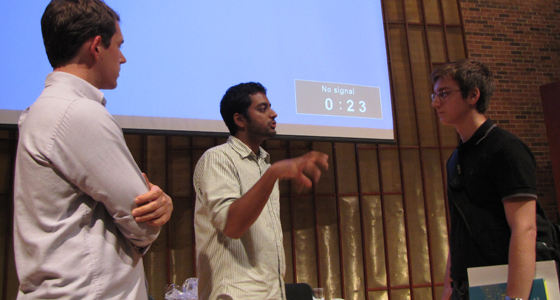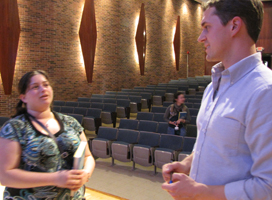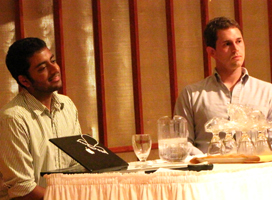

Venture Boldly

Adriana Colindres
Features Editor
2 East South Street
Galesburg, IL 61401


by Rana Tahir '13
On a black screen, a message in large white letters appeared: "What Laundry Can Teach Us about Changing the World." It seemed like an unusual way to begin a lecture.
Teju Ravilochan, co-founder of the Unreasonable Institute, recalled how at age 3, he decided he would do his own laundry. However, he was too small to reach the washing machine, so he came up with what he thought was "a reasonable alternative" -- flushing his clothes. When his mother found out, she taught him to do laundry.
The story is something everyone can relate to, he said. "All of us have a drive to do our own laundry, to be the masters of our own fate," he said.
Ravilochan and Nathaniel Koloc presented the annual Carlin Forum at Knox College on October 11 titled, "Your Idea Could Change the World!" (Photo at top of page: Koloc, left, and Ravilochan, center, talk with a Knox student.)
Ravilochan and Koloc are involved with the Unreasonable Institute, an organization that helps entrepreneurs by teaming them with mentors, capital, and networks to help realize their goals. Every year, 25 entrepreneurs from around the world come to Boulder, Colorado, for a six-week program focusing on mentorship, unity, finance, and networking.
The presentation at Knox College attracted more than 80 students (including faculty member Carissa Murphy's entire Business & Society class), faculty, and President Teresa Amott. The event was sponsored by Jane Strode Miller '81 and The John D. Carlin Career Development Support Fund.
 Ravilochan said the idea to create the Unreasonable Institute came out of a common issue he and his colleagues were facing when it came to solving the world's problems. "Even if we did have a clue, we don't have capital, or a network," to make anything happen, he said.
Ravilochan said the idea to create the Unreasonable Institute came out of a common issue he and his colleagues were facing when it came to solving the world's problems. "Even if we did have a clue, we don't have capital, or a network," to make anything happen, he said.
Despite some early difficulties, they were encouraged to go on by many of the entrepreneurs who would later be part of their mentor program.
The lecture focused on the question, "Can I have a career where I can make the world a better place and also a career where I can make a good living?"
Ravilochan's advice: "Take the risk."
He cited the example of Paul Pollack, a psychiatrist and entrepreneur who developed an irrigation system to help impoverished farmers increase their incomes. When the product was donated, only about 25% of the people who received the water systems used them. But when they were sold, almost everyone who bought one used it.
Ravilochan said that indicates people aren't looking for handouts. Instead, they want to be active agents in their own lives and economic mobility.
Ravilochan ended his portion of the lecture with a quote from economist and playwright George Bernard Shaw. "The reasonable man adapts himself to the world; the unreasonable one persists in trying to adapt the world to himself. Therefore, all progress depends on the unreasonable man."
Nathaniel Koloc, founder of ReWork, then described his experience as a Fellow at the Unreasonable Institute. He related to Knox students, saying, "If I was a student, what would I have wanted to say to myself?"
After graduating, he said, "I was ready to get out in the real world (and make a difference). It took me three to four months to realize it would be hard to live that out."
Koloc quoted civil rights leader Howard Thurman, who said, "Do not ask what the world needs. Ask instead what makes you come alive, and go do that. Because what the world needs most is people who have come alive."
Koloc found what made him come alive, and he formed Terrashift -- now named ReWork.
ReWork focuses on "human capital to impact the economy," he said. "We recruit sharp young people who it matters to them that they are working for a higher purpose."
If a company needs a team for a project, ReWork is a source. Young people work on these paid projects while looking for a job, and they gain valuable experience finding the thing that brings them to life.
Koloc advised, "Plan your life (not your career). Do your own thing. If your own thing involves risks, that's fine."
"Surround yourself with people who will support you, and you'll learn how to be a support to others." Koloc added.
In introductory remarks at the lecture, Knox President Teresa Amott described how the Unreasonable Institute presentation connects to the 175th anniversary of Knox College.
She referred to the founding of Knox by saying, "The notion in 1837 that there would be a college in the prairie that would include people of all genders and races (was) unreasonable."
"We are a place that was founded on an unreasonable idea and continues to support unreasonable ideas."
Photos by Hongyu "Sophie" Zhou '14
Published on October 14, 2011